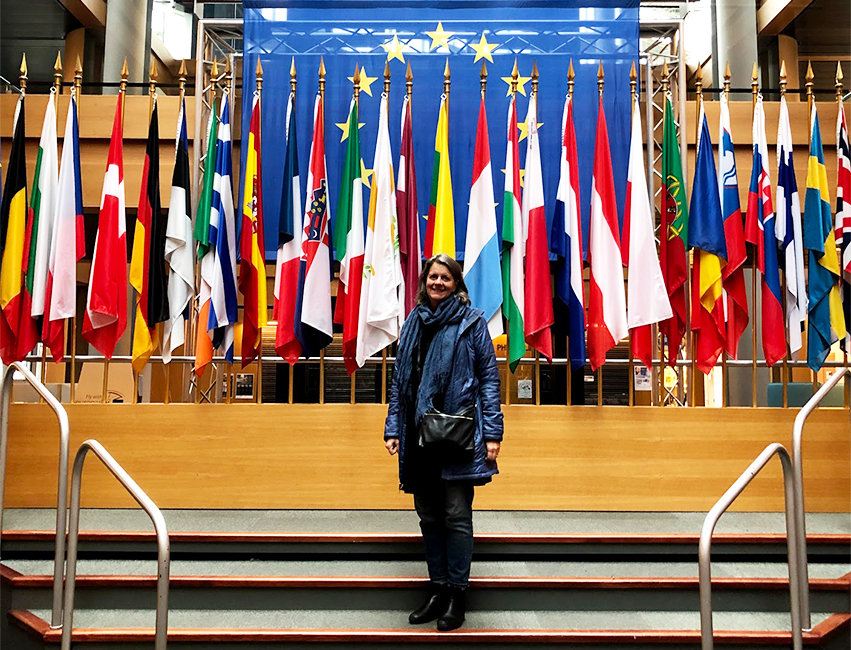German Higher Education: A Lesson in History, Freedom and Grace
December 11, 2019
Colleen Coxe, Harvey Mudd College senior director of corporate relations, received a Fulbright U.S. Scholar Program award to travel to Germany as part of the U.S.-Germany International Education Administrators Program (IEA). Coxe participated in a group seminar designed to familiarize U.S. higher education administrators with Germany’s higher education system, society and culture. Coxe recounts the experience here.
Standing at the gate at the airport in Frankfurt on Nov. 9, heading home from a two-week seminar hosted by Fulbright Germany, the TV monitors looped videos showing the fall of the Berlin Wall in 1989. I knew from meetings through the previous two weeks—the first of which was in Berlin—that the day I was leaving Germany was the 30th anniversary of the Berlin Wall coming down and the reunification of Berlin and East and West Germany. Nov. 9 also marks the end of the German monarchy in 1918, as well as the anniversary of Kristallnacht, the infamous night in 1938 when the Nazis burned or vandalized synagogues throughout the country, killed nearly 100 people and arrested 30,000 Jewish men and sent them to concentration camps.
When I booked my return flight, I had no idea of the significance of Nov. 9 for Germans, but after two weeks in Berlin, Nuremberg and Karlsruhe, I realized that I regretted leaving that day—a day that Germans observe as a way of signifying how the country’s past continues to shape its present. It is not a national holiday because of the day’s dark association with the Nazis, but rather a day of remembrance. Throughout our time, our German colleagues acknowledged the country’s past as a way of framing the German educational system’s commitment to equity and access.
The Fulbright Germany International Education Administrators (IEA) program is part of Fulbright’s U.S. Scholar Program, funded by the governments of the United States of America and the Federal Republic of Germany. The IEA seminar is an opportunity for individual professional development, as well as for citizen diplomacy and cultural exchange. The seminar’s focus on higher education provides a platform for peer exchange about the structural and philosophical underpinnings around an educated citizenry. The interrelationship between student mobility (international student exchange), freedom of science and diplomacy were themes that drove many of the discussions.
In the United States, academics largely assume that research in all areas of scholarship is feasible without government interference. Germans do not take that freedom for granted. Freedom of science (along with arts and expression) is guaranteed under the German constitution, which was adopted in 1949 by the Federal Republic of Germany, and again by a reunited Germany after the wall came down in 1990. Under the Nazi regime, Germans lost the freedom to pursue science and the arts, so their commitment to it comes from a place of deep understanding. Academic freedom came up repeatedly as a point of pride during our meetings with esteemed and historic institutions such as Humboldt University and the Max Planck Institute. In a conversation at the Foreign Office, the diplomat hosting us emphasized the German constitutional right to freedom of science, and how that commitment informs diplomacy and fosters the free exchange of ideas. Perhaps most significantly, when a group of 15 German higher education administrators joined us for several days in Berlin, academic freedom framed the presentations as well as informal conversations.
Guaranteed academic freedom, and an ongoing sense of responsibility for Germany’s past, are pillars of the country’s commitment to student mobility. A federal and state-funded agency committed to international academic cooperation, the DAAD, supports students from outside of Germany who would like to pursue undergraduate or graduate education in Germany. The country has become a safe destination for refugees, not least because tuition-free higher education is available to everyone—Germans and non-Germans.
The first few times one of our German presenters mentioned free tuition for all undergraduate and graduate education, we incredulous Americans kept saying “Free? It’s really free? How can you do that, and why would you encourage students from abroad to come to your institution?” Each time, the answer was framed by a sense of responsibility for the country’s past, as well as a belief that academic freedom, open borders and student exchange are good for Germany and good for a free world.
At the airport, just before I boarded, our group got a farewell message on WhatsApp from one of the German Fulbright program administrators. In it, she acknowledged the significance of the day, and called it a “very dark day in German history.”
“We always have to remember out of respect for all of the victims and crimes that Nazi Germany committed, and to do all we can so that it will never ever happen again. It’s our legacy as Germans, and I thought I would mention it, as the fall of the wall shall not make us forget our earlier history.”
I left the country awash with details about German universities, state and federal resources, research institutes and even the secondary school system. But the abiding impact for me will be the fragility of academic freedom, the remarkable example of humility and grace with which our German colleagues bore the weight of their history, and their deep commitment to international exchange as vital to the country’s place in the world.
